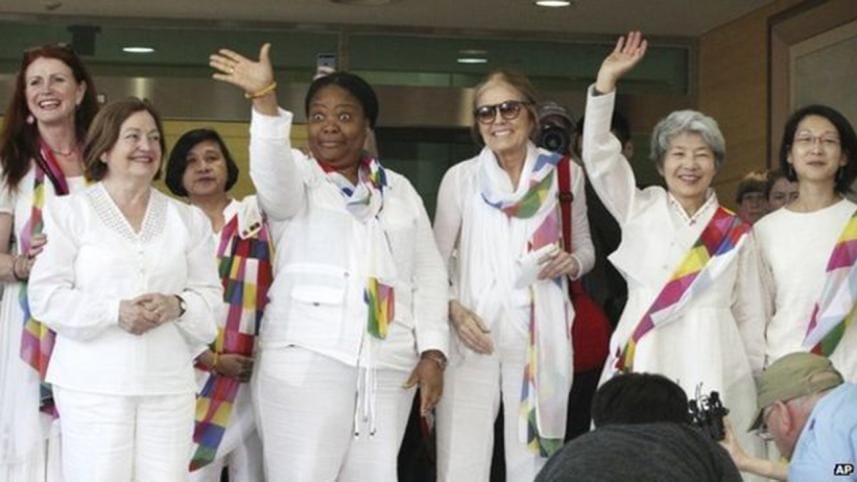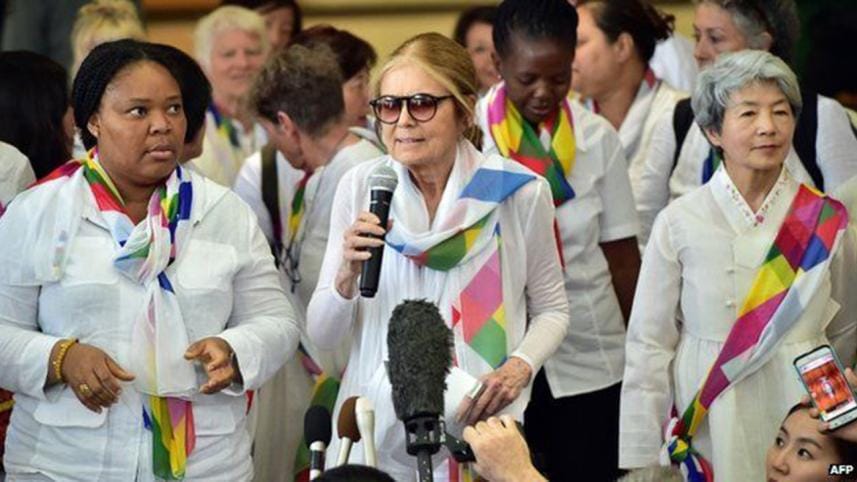Activists make rare Koreas crossing

A group of 30 women activists have crossed the demilitarized zone (DMZ) separating North and South Korea in an attempt to promote peace.
Led by American feminist Gloria Steinem, the group rode by bus over the DMZ from the North to the South.
But they were prevented from walking on foot through the abandoned village of Panmunjom, where the 1953 armistice that ended the Korean war was signed.
The activists have faced criticism for spending several days in Pyongyang.
Critics said the women had allowed themselves to become propaganda tools by the North, after they refused to directly criticise the Pyongyang authorities over its human rights record.

But Steinem dismissed the charge, saying the women were focused on breaking through barriers to make human connections and highlight the suffering that the division continues to impose.
She hailed the trip as a "triumph" for peace and reconciliation.
"I'm so confident that once it is clear what we have experienced, these objections will go away," she told reporters after the group arrived on the South Korean side of the border.
Songs and banners
The group had originally intended to walk through the "truce village" of Panmunjom, where North and South Korean soldiers are separated by several metres across the border.
But South Korea opposed the plan, sending a bus across the border to the North to fetch the women and transport them back over the border to the South.
The women sang and carried banners as they crossed the first checkpoint leading into the DMZ from North Korea.

They said the purpose of the crossing was to express hope that Korean families separated in the war could one day be united again and military tensions between the two sides reduced.
But one North Korean defector, Dr Lee Ae-ran, told the BBC that the women were promoting Pyongyang's viewpoint that the US and South Korea were to blame for the division of Korea.
"This is a so-called peace march but there is no peace here. [North Korea ruler] Kim Jong-un's nuclear ambitions and hostile acts towards the south prevents peace," she told the BBC's Stephen Evans in Seoul.
As a child, Dr Lee Ae-ran endured eight years of abuse and terrible living conditions at a labour camp after she and her family were deemed "bad elements" by the North Korean authorities when her grandparents defected to South Korea.
The activists who took part in Sunday's crossing included Nobel Peace Prize laureates Leymah Gbowee, from Liberia, and Mairead Maguire, from Northern Ireland.
The two Koreas remain technically at war in the wake of the 1950-53 Korean War, which ended in an armistice rather than a peace treaty.
The heavily-fortified DMZ - one of the world's most militarized borders - separates them and ties remain tense.
International talks aimed at ending Pyongyang's nuclear ambitions have been stalled since 2009.



 For all latest news, follow The Daily Star's Google News channel.
For all latest news, follow The Daily Star's Google News channel.
Comments